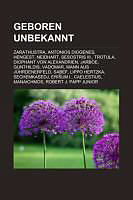Geboren Unbekannt
Einband:
Kartonierter Einband
EAN:
9781159170868
Untertitel:
Zarathustra, Antonios Diogenes, Hengest, Neidhart, Sesostris Iii., Trotula, Diophant Von Alexandrien, Jarboe, Gunthildis, Vadomar, Mann Aus Jührdenerfeld, Sabef, Lippo Hertzka, Sechemkasedj, Eri um I., Caelestius, Manaichmos
Genre:
Literarische Gattungen
Herausgeber:
Books LLC, Reference Series
Anzahl Seiten:
134
Erscheinungsdatum:
13.04.2020
ISBN:
978-1-159-17086-8
Klappentext
Quelle: Wikipedia. Seiten: 134. Nicht dargestellt. Kapitel: Zarathustra, Antonios Diogenes, Hengest, Neidhart, Sesostris Iii., Trotula, Diophant Von Alexandrien, Jarboe, Gunthildis, Vadomar, Mann Aus Jührdenerfeld, Sabef, Lippo Hertzka, Sechemkasedj, Eri um I., Caelestius, Manaichmos, Robert J. Papp Junior, Yusupha Kah, Ipi, Itika, Aa, Julius Blank, Makarios I., Sabu, Antef, Ahanacht I., Telephos, Amenemhet, Sechka, Vladimiras Nikitinas, Sosos, Suomar, Sulinus, Thomas Derrick, Neheri I., Hartapu, Anton Schulz, Khai Bua Ban, Marcus Aelius Apollonius. Auszug: Zoroaster (also known as Zarthusthra and Zarthost) (Avestan: Zaräu tra) (Persian: ) was an ancient Iranian prophet and philosopher, and the founder of the Zoroastrian religion. It is generally thought that he lived about the 10th or 11th century BCE, though some scholars believe that he lived sometime between 1750 and 1500 BC or between 1400 and 1200 BC. The traditional Parsi people of Pakistan and India place the Prophet as older than 6000 BC. The hymns attributed to him the Gathas are at the liturgical core of Zoroastrianism. His name in his native Avestan was Zarathustra (Zaräu tra). The Western-English names "Zoroaster" and "Zoroastrian" (ie. Mazdayasna) derive from a later (5th-century BCE) Greek translation of Zoroástres., as attested in the Lydiaka of Xanthus (frag. 32) and in Pseudo-Plato s Alcibiades Maior (122a1). The Greek Zoroástres appears to be based in 1) a phonetic transliteration or semantic substitution of the Avestan zarat- to the Greek zorós, the latter meaning "undiluted," and 2) from an association of ástra "stars" in place of the Avestan "-u tra," the Avestan word being widely accepted to mean or relate to "light" (see below). This form appears subsequently in the Latin Zoroastres and, in later Greek orthographies, as Zoroástris. In Avestan, Zaräu tra is generally accepted to derive from an Old Iranian *zarat-u tra-. While the first half of the name "zarat-" is strongly referenced to mean "golden," (cf. meanings) from the old Eastern-Iranian (and Modern Persian) zar- - , meaning "gold," it does not itself appear in Avestan. The second half of the name i.e. -u tra- is universally accepted to mean camel . These factors combined open the door for reconstructing the name's etymology, and there have been other alternative meanings proposed for "zarat-" such as "moving," "old," and "longing for." Reconstructions from later Iranian languages in particular from the Middle Persian (300 BCE-) Zartosht, which is the form the name has in the 9th

Leider konnten wir für diesen Artikel keine Preise ermitteln ...
billigbuch.ch sucht jetzt für Sie die besten Angebote ...
Die aktuellen Verkaufspreise von 6 Onlineshops werden in Realtime abgefragt.
Sie können das gewünschte Produkt anschliessend direkt beim Anbieter Ihrer Wahl bestellen.
Loading...
Die aktuellen Verkaufspreise von 6 Onlineshops werden in Realtime abgefragt.
Sie können das gewünschte Produkt anschliessend direkt beim Anbieter Ihrer Wahl bestellen.
| # | Onlineshop | Preis CHF | Versand CHF | Total CHF | ||
|---|---|---|---|---|---|---|
| 1 | Seller | 0.00 | 0.00 | 0.00 |
